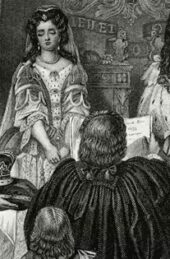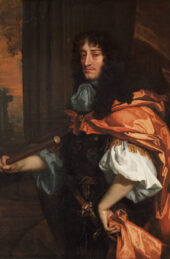The poet of Paradise Lost was better known in his own time as a pamphleteer. From 1641 to 1644, his writing optimistically imagined the world that might emerge from all the turmoil of civil war. It was an idealised, classical paradise of goodness, culture, education, free speech, sport, poetry, intellectualism and, more eccentrically, divorce.
Then suddenly Milton fell silent. His political silence would continue for four years.
In between March 1645 and February 1649, years of extraordinary national crisis when two civil wars were lost by the royalists and the Army published their intention to bring King Charles I to trial, Milton wrote no new pamphlets. He wrote little new poetry either, although he did publish a collected volume in 1645. What had happened?

Blake’s cover of Milton’s A Poem in Two Books
Milton’s retreat from the immediacy of contemporary events is understandable. He was beginning to go blind in one eye. His wife, who had initially left him after just a month of marriage, had returned and made him a father. But his problems were not only personal. In December 1644 Milton was hauled before two judges appointed by the House of Lords and questioned about a pro-divorce pamphlet he had published during his wife’s absence. Centuries ahead of his time in campaigning for no-fault divorce, Milton’s arguments were not well received. Former religio-political allies let the embattled lobbyist down. Milton had supported the Parliamentarians’ Presbyterian cause in a whole series of antiprelatical pamphlets. But the Presbyterians now singularly failed to support him.
Unsurprisingly, Milton became increasingly disillusioned with the revolution. The brave new world of his imagining showed no sign of materialising. In the circumstances, he turned to the genre of history. Milton the historian is a little-known figure. The work that he would eventually publish, unfinished, as The History of Britain (1670), hints liberally at its author’s motivations. He begins by observing that able historians have often chosen not to write about their own times because they perceived ‘how ignoble, how petty, how below all history the persons and their actions were’.

John Bradshaw
This does not mean that Milton did not have contemporary history in mind as he wrote. On the contrary, in one of the very first stories he tells, King Pandrasus (the father-in-law of Brutus) is held captive and threatened with death unless he agrees to certain conditions. It is hard to avoid a parallel to the captive King Charles I’s constant negotiations for his own political survival. More broadly, Milton uses history to try to understand why the English revolution is failing: is it a flaw in the national character that can be recognised throughout previous ages?
Whatever the merits of the theory, Milton got no further than the Norman Conquest. Contemporary events intervened urgently and galvanised the would-be historian into an unforeseeable new political role. Unexpectedly, a personal acquaintance of Milton’s became central to the trial of King Charles I. John Bradshaw, Milton’s own lawyer and (probably) cousin, was the man appointed to the daunting position of President of the High Court of Justice. Milton’s hopes of a brighter future for Britain seem to have revived. As the trial got going, so did Milton’s pen. The Tenure of Kings and Magistrates, his first pamphlet in four years, mounted arguments so ingenious that they teeter on the ridiculous. Milton argued, for example, that the regicides did not kill a king because Charles’s imprisoned and powerless state meant that he was no longer a king in any meaningful sense.
It was likely through his connection to Bradshaw that Milton was appointed as Secretary for Foreign Tongues and became the propagandist for the new Cromwellian government. King Charles I, beheaded on January 30th 1649, was reborn the very same day in print. The hugely popular royal memoir Eikon Basilike (The Portrait or Image of the King) turned the late king into a martyr. Milton responded damningly in Eikonoklastes (The Iconoclast). Written to sway the court of European public opinion, the book gained him much notoriety. If Milton was no longer writing history, he was certainly making it.
Julie Maxwell’s novel The Image of the King is published by Sharpe Books.







